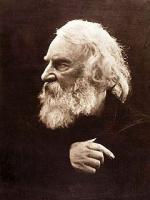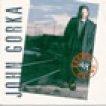I heard the bells on Christmas day
Their old familiar carols play,
And wild and sweet the words repeat
Of peace on earth, good will to men.
And thought how, as the day had come,
The belfries of all Christendom
Had rolled along the unbroken song
Of peace on earth, good will to men.
And in despair I bowed my head
“There is no peace on earth,” I said,
“For hate is strong and mocks the song
Of peace on earth, good will to men.”
Then pealed the bells more loud and deep:
“God is not dead, nor doth He sleep;
The wrong shall fail, the right prevail
With peace on earth, good will to men.”
Till ringing, singing on its way
The world revolved from night to day,
A voice, a chime, a chant sublime
Of peace on earth, good will to men.
Their old familiar carols play,
And wild and sweet the words repeat
Of peace on earth, good will to men.
And thought how, as the day had come,
The belfries of all Christendom
Had rolled along the unbroken song
Of peace on earth, good will to men.
And in despair I bowed my head
“There is no peace on earth,” I said,
“For hate is strong and mocks the song
Of peace on earth, good will to men.”
Then pealed the bells more loud and deep:
“God is not dead, nor doth He sleep;
The wrong shall fail, the right prevail
With peace on earth, good will to men.”
Till ringing, singing on its way
The world revolved from night to day,
A voice, a chime, a chant sublime
Of peace on earth, good will to men.
envoyé par Riccardo Venturi - 12/1/2008 - 05:15
Langue: anglais
Historical Note: The Missing Stanzas
This hymn was written during the American civil war, as reflected by the sense of despair in the next to last stanza of the current, common presentation (above). The original stanzas 4 and 5 (below) speak of the battle, and are usually omitted from hymnals:
Nota Storica: Le Strofe Mancanti
Questo inno fu scritto durante la Guerra di secessione americana, come è evidente dalla penultima strofa della versione corrente. La quarta e la quinta strofa originali (qui presentate) descrivono la battaglia, e sono usualmente omesse dai libri di inni:
This hymn was written during the American civil war, as reflected by the sense of despair in the next to last stanza of the current, common presentation (above). The original stanzas 4 and 5 (below) speak of the battle, and are usually omitted from hymnals:
Nota Storica: Le Strofe Mancanti
Questo inno fu scritto durante la Guerra di secessione americana, come è evidente dalla penultima strofa della versione corrente. La quarta e la quinta strofa originali (qui presentate) descrivono la battaglia, e sono usualmente omesse dai libri di inni:
Then from each black, accursed mouth
The cannon thundered in the South,
And with the sound the carols drowned
Of peace on earth, good will to men.
It was as if an earthquake rent
The hearth-stones of a continent,
And made forlorn, the households born
Of peace on earth, good will to men.
The cannon thundered in the South,
And with the sound the carols drowned
Of peace on earth, good will to men.
It was as if an earthquake rent
The hearth-stones of a continent,
And made forlorn, the households born
Of peace on earth, good will to men.
envoyé par Riccardo Venturi - 12/1/2008 - 05:17
Langue: italien
Versione italiana di Riccardo Venturi
13 gennaio 2008
13 gennaio 2008
HO SENTITO LE CAMPANE PER NATALE
Ho sentito le campane, per Natale,
suonar le loro vecchie càrole consuete
e ripetere, dolci e libere, le parole
di pace sulla terra, di buona volontà per gli uomini.
E pensavo a come, venuto quel giorno,
i campanili di tutta la Cristianità
avevano battuto al canto ininterrotto
di pace sulla terra, di buona volontà per gli uomini.
E, disperato, ho chinato la testa
"Non c'è pace sulla terra", ho detto,
"Perché l'odio è troppo forte e si fa gioco del canto
di pace sulla terra, di buona volontà per gli uomini."
Allora le campane hanno rintoccato più forte e profondo:
"Dio non è morto, e non dorme;
Il male fallirà, il bene prevarrà
con pace sulla terra, con buona volontà per gli uomini."
Finché con quei rintocchi e con quel canto
il mondo non è tornato dalla notte al giorno,
una voce, una melodia, un canto sublime
di pace sulla terra, di buona volontà per gli uomini.
Ho sentito le campane, per Natale,
suonar le loro vecchie càrole consuete
e ripetere, dolci e libere, le parole
di pace sulla terra, di buona volontà per gli uomini.
E pensavo a come, venuto quel giorno,
i campanili di tutta la Cristianità
avevano battuto al canto ininterrotto
di pace sulla terra, di buona volontà per gli uomini.
E, disperato, ho chinato la testa
"Non c'è pace sulla terra", ho detto,
"Perché l'odio è troppo forte e si fa gioco del canto
di pace sulla terra, di buona volontà per gli uomini."
Allora le campane hanno rintoccato più forte e profondo:
"Dio non è morto, e non dorme;
Il male fallirà, il bene prevarrà
con pace sulla terra, con buona volontà per gli uomini."
Finché con quei rintocchi e con quel canto
il mondo non è tornato dalla notte al giorno,
una voce, una melodia, un canto sublime
di pace sulla terra, di buona volontà per gli uomini.
Langue: italien
La versione italiana delle strofe mancanti:
Poi da ogni bocca nera e maledetta
il cannone tuonò nel Sud,
ed in quei rombi annegaron le càrole
di pace sulla terra, di buona volontà per gli uomini.
Fu come se un terremoto scuotesse
le pietre focaie di un continente
e mandasse in rovina i focolari domestici
di pace sulla terra, di buona volontà per gli uomini.
il cannone tuonò nel Sud,
ed in quei rombi annegaron le càrole
di pace sulla terra, di buona volontà per gli uomini.
Fu come se un terremoto scuotesse
le pietre focaie di un continente
e mandasse in rovina i focolari domestici
di pace sulla terra, di buona volontà per gli uomini.
envoyé par Riccardo Venturi - 14/1/2008 - 01:54
Langue: russe
Перевод Дмитрия Шаталова (translation by Dmitry Shatalov)
Рождественские колокола
На Рождество услышал вдруг
Я сердцу милый с детства звук
Колоколов и сладких слов
О мире в людях на Земле.
И я представил, как с утра
Бьют на Земле в колокола,
Как день тот весь поётся весть
О мире в людях на Земле.
Но прогремел вдруг на весь юг
Из чёрных пастей пушек звук.
Он громче был, не слышал мир
О мире в людях на Земле.
Рёв будто плиты очага
Разбил в коре материка.
Теперь пусты семей мечты
О мире в людях на Земле.
Тогда я волю дал слезам.
«Нет мира в людях», – я сказал.
Вражда сильна, глумит она
Над миром в людях на Земле.
Стал громче, глубже перезвон.
Бог жив, не спит на троне Он.
Наступит день, падёт злодей
От мира в людях на Земле.
Вращаясь, пела вся Земля.
Исчезла ночь при свете дня.
Не зря, не зря звонит заря
О мире в людях на Земле.
На Рождество услышал вдруг
Я сердцу милый с детства звук
Колоколов и сладких слов
О мире в людях на Земле.
И я представил, как с утра
Бьют на Земле в колокола,
Как день тот весь поётся весть
О мире в людях на Земле.
Но прогремел вдруг на весь юг
Из чёрных пастей пушек звук.
Он громче был, не слышал мир
О мире в людях на Земле.
Рёв будто плиты очага
Разбил в коре материка.
Теперь пусты семей мечты
О мире в людях на Земле.
Тогда я волю дал слезам.
«Нет мира в людях», – я сказал.
Вражда сильна, глумит она
Над миром в людях на Земле.
Стал громче, глубже перезвон.
Бог жив, не спит на троне Он.
Наступит день, падёт злодей
От мира в людях на Земле.
Вращаясь, пела вся Земля.
Исчезла ночь при свете дня.
Не зря, не зря звонит заря
О мире в людях на Земле.
envoyé par Dmitry Shatalov - 24/10/2022 - 10:27
×
![]()





A Christmas carol based on the poem Christmas Bells by Harry Wadsworth Longfellow
Càrola natalizia basata sulla poesia Christmas Bells di Henry Wadsworth Longfellow
Tunes / Melodie:
1. John Baptiste Calkin, "Waltham" [1872]
2. Joseph Mainzer, "Mainzer" [orig. 1845]
3. Johnny Marks [1950]
4. John Gorka [1990]
Longfellow wrote "Christmas Bells" on Christmas day 1864 in the midst of the American Civil War and the news of his son Charles Appleton Longfellow having suffered wounds as a soldier in battle. He had suffered the great loss of his wife two years prior to an accident with fire. His despair in the following years after was recorded in his journal.
The poem has been set to several tunes. The first tune was set in the 1870s by an English organist, John Baptiste Calkin, to his composition "Waltham". Less commonly, the poem has also been set to the 1845 composition "Mainzer" by Joseph Mainzer. Johnny Marks, known for his song "Rudolph the Red-Nosed Reindeer", set Longfellow’s poem to music in the 1950s. Marks' version has been recorded by Fred Waring and the Pennsylvanians, Kate Smith, Frank Sinatra, Sarah McLachlan, Pedro the Lion, Harry Belafonte, Johnny Cash, The Carpenters and Bing Crosby. Marks' composition is now generally accepted as the de facto version and is generally what is used for modern recordings of the song, though Calkin's version is still heard as well. In 1990, John Gorka recorded his arrangement entitled "Christmas Bells", which uses stanzas 1, 2, 6, and 7 of the poem.
"I Heard the Bells on Christmas Day" è una càrola natalizia basata sulla poesia "Christmas Bells", composta da Henry Wadsworth Longfellow (1807-1882) nel 1864.
Longfellow scrisse "Christmas Bells" il giorno di Natale del 1864 in piena Guerra di secessione, alla notizia che suo figlio Charles Appleton Longfellow era stato gravemente ferito in battaglia. Due anni prima il poeta aveva perso la moglie, ustionata a morte in un incidente domestico. Negli anni successivi, avrebbe registrato la sua disperazione nel suo diario.
La poesia è stata messa in musica su diverse melodie. La prima fu scritta attorno al 1870 da un organista inglese, John Baptiste Calkin, per la sua composizione "Waltham". Meno comunemente la poesia è stata cantata sull'aria della composizione "Mainzer" di Joseph Mainzer. Johnny Marks, noto per la canzone "Rudolph the Red-Nosed Reindeer", ha musicato la poesia di Longfellow negli anni '50; la versione di Marks è stata incisa da Fred Waring and the Pennsylvanians, Kate Smith, Frank Sinatra, Sarah McLachlan, Pedro the Lion, Harry Belafonte, Johnny Cash, The Carpenters e Bing Crosby. La versione di Marks è ora generalmente considerata come standard ed è quella usata per le incisioni moderne della canzone, sebbene la versione di Calkin sia ancora ascoltata. Nel 1990 John Gorka ha inciso il suo arrangiamento, intitolato "Christmas Bells", il quale usa le strofe 1, 2, 6 e 7 della poesia.